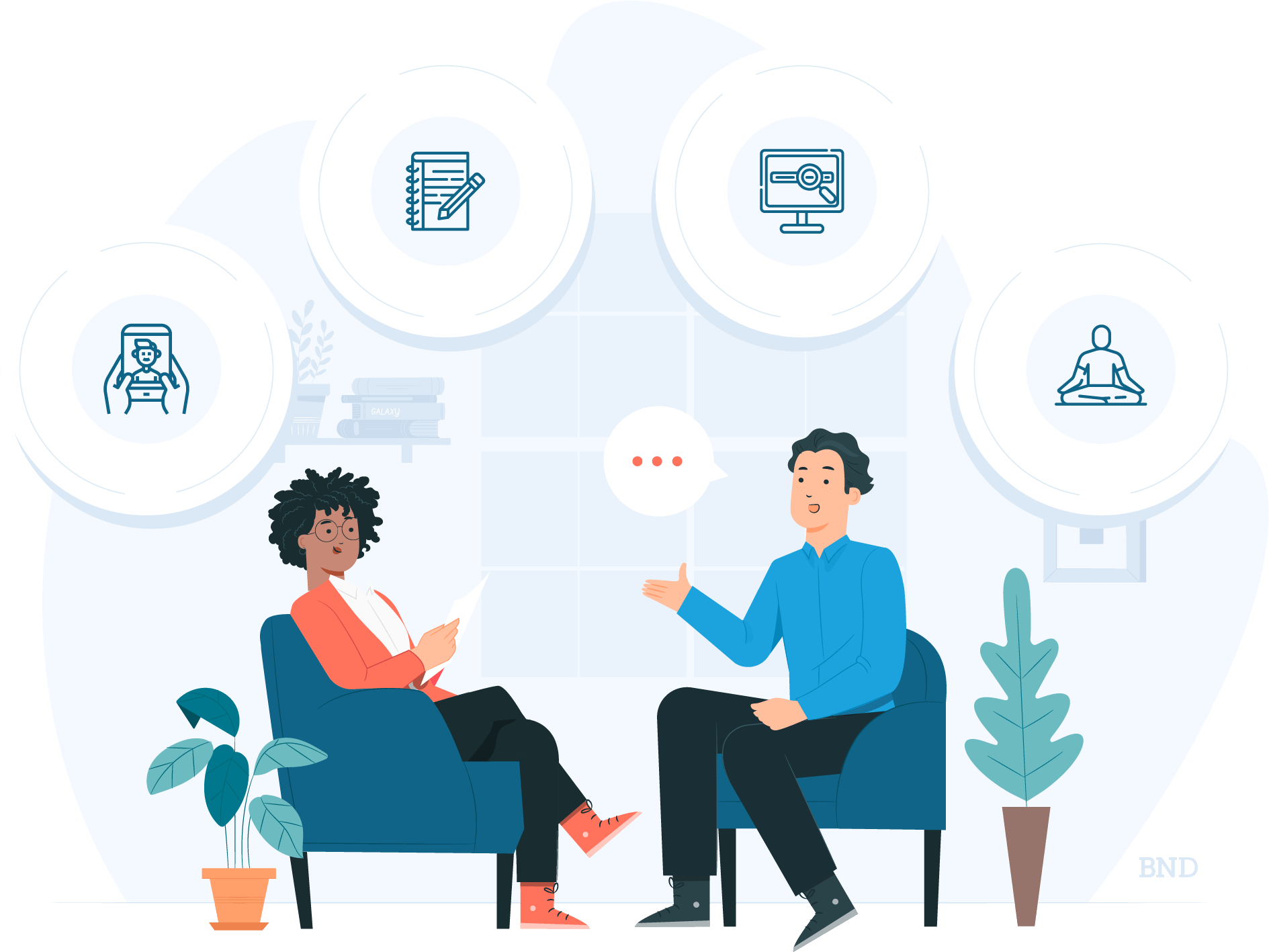Interview Body Language Explained
- Body language and nonverbal cues comprise a significant portion of the messages we convey to others.
- It’s crucial to be aware of your body language during a job interview; you may unwittingly convey negative messages.
- Today’s digital interview environments require additional considerations about how nonverbal messages impact how an interviewer sees you.
- This article is for job seekers looking for new employment or career advancement opportunities in their current workplace.
Imagine this scenario: Chris sidles slowly into the conference room – avoiding eye contact – slinks to a vacant chair, and slumps into it, staring down at the floor. Chris looks up only when the interviewer says, “Thank you, Chris, for interviewing with us today.”
Not a great first impression, especially for a job interview.
In contrast, Pat walks confidently into the room, smiling and making eye contact with each person at the conference table. Pat takes a seat, sits up straight, and engages in small talk while waiting for the interview to begin.
Which candidate do you think has a better shot at the position – even before they’ve answered a single question?
Mục Lục
What your body language tells a job interviewer

Job interview mistakes, including saying the wrong thing and being unfamiliar with the company, are all too common. However, job interviews aren’t just about what you say. How you conduct yourself in a nonverbal way also speaks volumes.
Hiring managers pay attention to your great resume and answers to specific questions, but they also examine the way you deliver your responses and how you act.
Consider your past job interviews, and ask yourself the following questions.
- Did you look them in the eye? A lack of eye contact can convey diminished self-confidence and may even make you seem untrustworthy.
- Did you fidget? Fidgeting, including playing with your pen, can indicate distraction and a lack of interest.
- Did you fold your arms across your chest? A stance of arms folded across the chest can come off as defensive and rigid.
- Did you send contradictory messages? Did you shake your head “no” when asserting something is true? Or did you nod your head “yes” when denying something? This behavior can make you appear confused or untruthful.
Nonverbal cues become part of a hiring manager’s overall impression of you. In an interview setting, it’s crucial to be aware of your body language in addition to what you say.
Did You Know?
Employers sometimes run background checks on potential new hires to confirm their identity, check for criminal records, verify education, and screen social media profiles for red flags.
Body language tips for job interviews
You may have all the skills employers want but come off as a poor candidate during an interview – and your nonverbal communication may be to blame. Psychologist Albert Mehrabian’s research is widely cited when discussing how critical body language and nonverbal communication are in our interactions with others. Mehrabian pointed to three crucial elements that affect how others see us:
- Spoken words account for 7% of how others see us.
- Tone of voice accounts for 38% of how others see us.
- Body language accounts for 55% of how others see us.
Interview skills are more than telling a compelling story and selling hiring managers on your skills. Here are some tips for making a positive impression without saying a word.
- Sit up straight. Good posture shows you’re engaged and paying attention. Additionally, a slight lean forward conveys genuine interest.
- Smile. A warm, genuine smile makes everyone feel more comfortable, particularly at the beginning and end of an interview.
- Practice appropriate facial expressions. Smiles may only be appropriate during part of the job interview. Avoid serving up a big grin when discussing serious topics. However, check your expressions in the mirror to see if your “concerned” and “thoughtful” faces look more like scowls. It’s OK to practice facial expressions in the mirror to project the visage you want.
- Practice your handshake. Reach out to your interviewer with a firm handshake. If they extend a hand first, respond immediately so you don’t leave them hanging. Also, while your handshake shouldn’t be limp, don’t overcompensate with a crushing squeeze.
- Watch your gestures. Hand gestures during the conversation are fine and can even convey enthusiasm. However, don’t fidget, shake your leg, tap your fingers, or play with a pencil.
- Maintain eye contact. Eye contact is a crucial element of business etiquette in general, and it’s essential in a job interview. While you don’t want to stare down your interviewer, eye contact is critical for making a connection and showing respect. Take small breaks to look away, jot notes, consider their points, and then regain eye contact. The goal is to be engaged and interactive. If you’re frequently looking over your shoulder or down at the floor, you’ll unwittingly convey disinterest and a lack of respect.
- Maintain your focus on the interviewers. This is similar to eye contact, but it’s especially important when you’re speaking to an interview panel or more than one hiring manager. Shift your focus to whoever is speaking, and avoid looking around the room, or you’ll risk coming off as disinterested.
- Leave your phone behind. This may seem obvious, but crazy job interview mistakes like using your phone do happen. Turn off your phone and stay completely invested and present during the interview. Glancing at your phone – even to check the time– is rude and disrespectful.
What to consider during virtual job interviews

Remote interviews have become increasingly common, whether they’re for an out-of-state job interview, an interview for a remote position, or just a more convenient way to conduct a job interview for the hiring manager or candidate.
Many elements of positive body language during a job interview apply to both in-person and virtual interviews. Facial expressions, smiles, eye contact, and focus are critical no matter what interview type you’re experiencing.
However, there are a few elements specific to virtual interviews to pay attention to:
- Practice with your camera. Ensure your computer’s camera is on, and practice ahead of time to see that you’re appropriately framed. Examine how you appear looking into the camera, and ensure the lighting is appropriate.
- Optimize your interview background. Don’t conduct an interview from your bedroom with plumped-up pillows behind you and dirty clothes strewn over the bedpost. If you don’t have an appropriate physical background, use a virtual background or blur it out.
- Practice focusing on the screen. It’s easy to get distracted during video conferences, but remember that you’re on camera. Don’t look around the room, use your phone, or appear preoccupied. Hiring managers know that distracted workers cost money, so distracted candidates present a big red flag.
- Practice good posture. Posture is particularly important in a virtual setting. You have fewer tools to show that you’re engaged and interested, and posture is one of them. Even in a virtual interaction, sitting up straight makes a difference.
- Stay seated and be prepared. Getting up and down or reaching for items on your desk are additional ways to appear distracted and uninterested. Have everything you need on hand, and show respect and interest by focusing on the interviewers.
Tip
Avoid signs of Zoom burnout during your interview, even if you’ve had several virtual interviews in a day. Take breaks between Zoom meetings and focus on being fresh and attentive.
Additional job interview tips

Here are some additional tips for acing your next interview – virtual or in-person – and sending the right nonverbal signals.
- Practice. Preparation is the best way to avoid an interview disaster. Practice ahead of time by recording yourself and playing back the video, or work with friends or family members who can offer feedback and advice.
- Create and rehearse your elevator pitch. An elevator pitch is a 30-second speech summarizing what you do and why you’d be a perfect fit for the role. It’s an excellent tool when someone says, “Tell me about yourself.”
- Do your homework. Take time before an interview to research the company, and come prepared with several thoughtful questions for the interviewer. Your preparation signals your interest in the position and the company.
- Relax. It’s OK to be nervous, but it’s not OK to fidget. Take a few deep breaths before the interview to help relieve stress, and go in knowing you’re presenting yourself in the best possible light.
When it comes to job interviews, first impressions matter – and your nonverbal signals are often a huge part of the impression you convey. Preparing for a successful job interview involves becoming comfortable with the interview process and showcasing yourself as a respectful, interested and engaged candidate.
Be prepared, confident and cognizant of what your body language tells your interviewer, and let your skills and talents shine.
Marci Martin contributed to the reporting and writing in this article.















![Toni Kroos là ai? [ sự thật về tiểu sử đầy đủ Toni Kroos ]](https://evbn.org/wp-content/uploads/New-Project-6635-1671934592.jpg)


